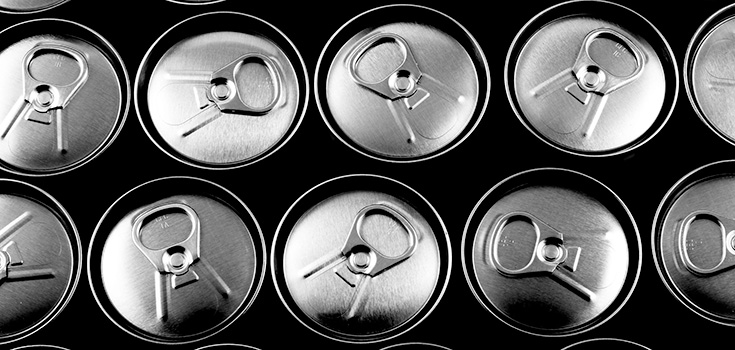BPA Blood Levels Spike by 1,200 Percent After Eating Canned Foods

New research from Harvard University has found that eating canned soup can spike your urinary bisphenol A (BPA) levels by 1,200 percent compared to fresh soup. Described as “one of the first to quantify BPA levels in humans after ingestion of canned foods,” the study examines the volume in which cancer-causing BPA contaminates canned goods across the world.
The research appears in the Journal of the American Medical Association November issue. BPA of course has been linked to countless diseases, including breast cancer and fertility defects that can lead to infertility. In fact 130 studies have been conducted on the link between BPA and breast cancer alone — all of which confirmed the relationship.
BPA Content of Canned Foods may Surpass Plastic Products
Harvard researchers not only identified the massive amount of BPA present in canned foods, but they also compared the content to BPA levels present in water bottles and other plastic containers. What they found was quite shocking: it appears that canned foods may be presenting an even greater risk to your health than many plastics due to the extremely high BPA content. This is also particularly true due to the widespread usage of canned goods, which are a staple in the diet of many individuals worldwide.
“We’ve known for a while that drinking beverages that have been stored in certain hard plastics can increase the amount of BPA in your body,” said lead author Jenny Carwile, a doctoral student in the Department of Epidemiology at Harvard School of Public Health. “This study suggests that canned foods may be an even greater concern, especially given their wide use.”
The study examined 75 participants, eating a 12-ounce serving of either fresh or canned soup for 5 days in a row. They were instructed to keep the rest of their nutritional habits the same. After a 2 day break, the groups switched and ate the opposite type of canned soup. A urine analysis then showed that the canned soup eaters have 1,221 percent higher levels of BPA than the individuals who ate the fresh soup.
In order to avoid exposing yourself to such high levels of BPA, preparing your own meals with fresh ingredients and avoiding food cans altogether is the best option. However, you can also contact individual brands and ask if their cans contain or are lined with BPA. If you have been eating from cans or plastic containers like the majority of consumers, there is also a natural solution. There exists a number of effective and free ways to rid the presence of BPA from your body, using health-promoting substances.

Wow! Talk about motivation to prepare your own foods.
BPA is a serious issue. This came out at the right time, before Thanksgiving where everyone uses canned goods.
The simple solution is to REMOVE it from the cans.
1221 percent higher than what? 12.21 ppm is 1221 percent higher than 1. Is 12.21 ppm going to give me cancer? How much soup would I have to eat from a can? If you have no reference this article is pseudoscience at best, hysteria at worst, much as I hate the corruption of the food supply..
BPA is known to cause endocrine disruption with just a few ppm in most individuals. Studies in animals demonstrate this low level of life long exposure causes cancer (breast, prostate, and lower-pelvic region cancers due to estrogenic effects), low-birth weight, and infertility. The danger is in the fact that low level chronic exposure over an individuals life (in just a few ppm per day) is enough exposure to cause slight hormonal balance problems. These subtle hormone imbalances are associated with a long list of general and ambiguous symptoms that are "sub-clinical" according to the "standard of care" practiced by most conventional physicians. In other words, whether you have headaches, migraines, PMS, bloating, water retention, increased body fat/weight gain, etc…"you'll just need to take something to treat the symptoms until we can find something wrong, then we can fix it (i.e. tumors.)" …"if we find cancer, well your environment or diet had nothing to do with it, you can blame your parents for giving you bad genes and the consequent suffering your about to experience with going through chemo and radiation!"
This is made even more scary by the fact that BPA has no practical benefits for being in plastic according to most plastic engineers. Their response for BPA use is simply "industry practice" or tradition. So, if it adds no benefit to being in the plastic but in such tiny amounts screws with our hormones (also premature development in young girls and delayed development in young boys and making them more effeminate), then why risk putting it in there at all? Interestingly, the FDA has been mandating the use of BPA in bottle sanitation process for some undisclosed reason. This has caused BPA to be found in several ppm in Organic baby food bottled in glass. What's the rationale for doing that?
To my knowledge, their is no "can lining" being used in the industry worldwide that doesn't have BPA.
"We are no longer in Kansas Toto!"
Wonder if the type of contents, i.e. solid tuna vs soup makes a difference in the amount of BPA consumed?
Knowledge is power. Take control of your health, and the health of your family. Eat fresh and organic as much as possible. Avoid Aspartame like the plague.
The headline is incorrect. It was urine BPA levels that spiked, not blood BPA levels. BPA is excreted very rapidly in urine and is often undetecable in the blood even after quite large exposures.